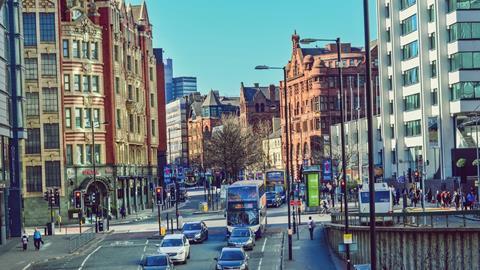Greater Manchester is putting the finishing touches to its clean air plan (CAP) – and it still intends not to charge any vehicle on its roads.
City mayor Andy Burnham has previously refused to introduce charges, describing it as a “red line” that it would not cross.
Its original CAP was due to launch in 2022, but it was put on hold due to concerns that hauliers would struggle to invest in cleaner vehicles and that the scheme would hit supply chains and the cost and availability of second-hand vehicles.
An updated CAP will now be submitted to the government; modelling work showed that the plan would bring air quality within legal limits for nitrogen dioxide on local roads by 2026 at the latest.
Transport for Greater Manchester said its data showed that air pollution had fallen compared to 2022 and was significantly lower than the levels recorded pre-pandemic.
It said this was in part driven by investment in cleaner buses.
In a report to the Greater Manchester joint clean air scrutiny committee, made up of members from councils in the North West, it said the government was reluctant to provide funding to support HGVs without the introduction of a charging zone.
However, it added: “Evidence showed that compliance could be achieved without upgrading the HGV fleet at this point.
“Tackling air pollution necessitated a multi-pronged approach that included addressing emissions from all types of vehicles.
“However, currently it was about prioritising what would give the biggest impact in the shortest time. In comparison with other polluters, heavy goods vehicles compared to buses and taxis, were small.”
Councillor Eamonn O’Brien, leader of Bury Council and clean air lead for Greater Manchester, said: “Greater Manchester has carried out a tremendous amount of work to get us to a place where we are seeing air quality improvements.
“Given some of the changes that have occurred in the last nine months, there was a need to adapt and update our proposals for an investment-led, non-charging GM clean air plan.
“We’re now in a position where that work has been done and, subject to approvals, we can submit our updated plan to the new government as soon as possible and await their decision.”













